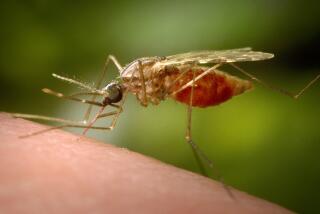Battling Infections Spread by War
- Share via
“The Microbes of Mayhem” (Commentary, May 10), about the spreading of disease through Sudan’s ethnic conflict, was an eye-opener. President Clinton had said that it was unfortunate that so many were dying in Rwanda 10 years ago, but it was not in the United States’ interests to intervene and stop the genocide against the Tutsis by the Hutus. But if stopping ethnic cleansing helps prevent the spread of disease in Africa, pragmatically, if not morally, it’s in our best interests to do so.
Thanks to this commentary, we can see a connection between war and disease. The Bush administration should be commended for speaking out in the United Nations to try to stop the Sudanese rulers in Khartoum from their ethnic cleansing of Christians in southern Sudan and ethnic Africans in Darfur. Unfortunately, Bush 43 has little credibility in the U.N., since his administration is suspected of being infected with the microbes of lies.
John Wisdom Dancer
Canoga Park
*
The poor people of Sudan face more than the microbes of mayhem. Clinton authorized the bombing of a chemical plant in that country. This plant made half the medicines for human use and all of the veterinary medicines used in that country. When the drug for tuberculosis, for example, could not be replaced on world markets at a price these poor people could afford, the people died. Animal diseases became epidemic and spread to humans, first to the children because they were closest to the animals. So it is not just HIV, Ebola and West Nile virus that are decimating these people.
When the U.N. asked for an investigation of our bombing of the chemical plant, we used our vote on the Security Council to block it. What have we done in the Middle East, and what are we doing now?
Tom Freeman
Pinon Hills
More to Read
Sign up for Essential California
The most important California stories and recommendations in your inbox every morning.
You may occasionally receive promotional content from the Los Angeles Times.













